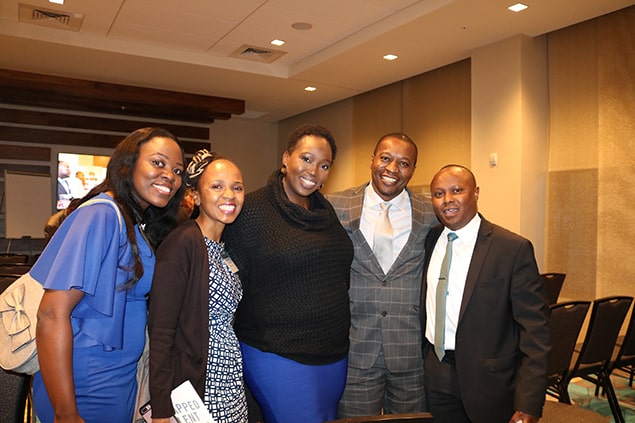Massachusetts is home to some 82,000 African immigrants, many of whom are fluent in English. Overall, immigrants from Africa are one of the most highly educated immigrant groups in the United States. According to New American Economy, 40 percent of African immigrants have a college degree, attaining a higher level of education than that of the U.S. population. Yet Emmanuel Owusu, an African immigrant in the Boston area, saw members of his community working low-wage jobs that were not commensurate with their international education or experience—just as he had done as a new arrival. Owusu, compelled to share his professional insights with other African newcomers, co-founded the African Bridge Network (ABN) in 2015 to facilitate opportunities for fellow immigrants to realize their full professional potential. ABN offers four core programs aimed at supporting skilled immigrants and refugees. Its Orientation Workshop, offered four times a year at the Boston Public Library, supports internationally educated immigrants who have been in the U.S. from three to five years. “The earlier we get folks in, the better,” Owusu says. “We are trying to reduce the number of years it takes individuals to build a career in the U.S., as well as the trial and error that costs them time, effort, and financial resources.” For those who are further along in their professional development, ABN offers its three other programs: Job Search and Career Advising, Professional Mentorship, and Professional Networking.
These three programs provide a kind of on-ramp to U.S. professional culture. ABN alum Chisom Onyekaonwu came to the U.S. from Nigeria in 2016 and earned a master’s degree in finance at Brandeis University. With her accounting experience in Lagos and her new business degree, she expected her professional journey in the U.S. to go smoothly. But despite her impressive résumé, Onyekaonwu struggled to connect with potential employers. An ABN workshop, however, helped Onyekaonwu realize that her communication style, which was considered professional in Nigeria, sounded “robotic” to American ears. She availed herself of ABN’s coaching to practice interviewing in the American style, and soon landed a job with Ernst & Young.
Owusu points out that Onyekaonwu’s experience is not unique. Many immigrants with degrees struggle to find work in their fields because of a lack of awareness of U.S. workplace norms and a limited support network. ABN’s Professional Mentorship and Professional Networking programs not only provide career support, they also help create a supportive community for those who have no family in the U.S. Mentors and protégés meet monthly and attend workshops to share their experiences and aspirations.
ABN has also begun making connections with local employers like hospitals and other health care facilities that may need guidance recruiting immigrant and refugee professionals—a critical move in light of staff shortages as a result of the COVID-19 pandemic. Because many African immigrants are health and human services professionals, ABN has embarked on two initiatives specific to those fields, one academic and one practical. The former is the Untapped Talents Project, a joint leadership diversity initiative providing opportunities for career development to professionals born outside of the U.S. This project is helmed by ABN and four partner human services agencies: Bay Cove Human Services, Thrive Support & Advocacy, Horace Mann Educational Associates (HMEA), and Venture Community Services.
On the health care side, Owusu contacted the Boston Private Industry Council to seek support assembling a health care advisory panel for ABN. Four organizations answered the call: Partners Healthcare (now Mass General Brigham), Beth Israel Deaconess Medical Center, Boston Children’s Hospital, and Lowell Community Health Center. These partnerships are mutually beneficial: The hospitals tell ABN what they’re looking for in employees, and ABN uses those insights to inform its coaching. If there is an opening at one of the hospitals, Owusu sends over résumés of ABN patrons who might be a good fit.
Owusu is confident that such collaboration will also lead to financial support—one hospital has already donated twice to support ABN’s work. This support could make a big difference to the mostly volunteer-run organization. In the meantime, Owusu plans to bolster his pool of volunteers by recruiting graduates to come back and serve as mentors. Now that ABN’s first graduates are settling into their own professional success in the U.S., they too can share their acquired wisdom with the next generation of immigrants seeking to realize their professional potential.
To learn more about other programs like ABN, visit our interactive program map.



